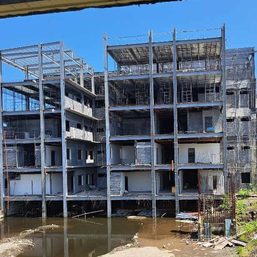SUMMARY
This is AI generated summarization, which may have errors. For context, always refer to the full article.

MANILA, Philippines – Health Secretary Ted Herbosa said he would create a nursing council with a de facto “nursing chief” to address issues that would improve working conditions for nurses.
“The WHO [World Health Organization] actually recommends a chief nursing officer…. I said, I’ll do more than that. I’ll support the creation of a chief nursing officer, but I’ll also create a whole council. So natuwa sila (they were happy] because I gave them more than what they were asking for,” Herbosa told reporters Monday morning.
The health chief, who is less than a month into his new role, said he would then ask Congress to pass a law to make the chief nursing law legal.

“I’ll create a national council with the team of nurses. I met last Thursday with the National Nursing Advisory Council. We will get the heads of the Philippine Nurses Association, the Philippine Board of Nursing, the head of Association of Nursing Service Administrators of the Philippines (ANSAP), and the private and the public nurses so that we can make them address all these issues,” Herbosa added.
Herbosa is concerned that if issues of nurses are not addressed, the nursing workforce may nearly disappear.
The health chief pointed out that public hospital nurses are currently earning salary grade 15 or higher, or at least P35,000 a month to P50,000 a month.
Last May, House of Representatives Minority Leader Marcelino Libanan called for the passage of House Bill 5276 which would increase the basic monthly salary of government nurses to P64,000.
Aside from pay, the health department also wants to address the working conditions of the nurses, including work-life balance.
“There should be life-work balance, other reasons to motivate them to stay and fight the brain drain to other countries,” Herbosa said, highlighting that most nurses would opt to stay if given a more competitive salary in the Philippines.
Physician and registered nurse Carl Balita, who owns 180 nursing review centers across the Philippines, spoke at the same press conference and echoed Herbosa’s assessment.
He said that aside from salary, recognition, and wellness, career progression and security of tenure are what nurses are looking for.
“Balance of work and life, by theory and research [are important],” Balita said. “Mahirap pikitin ang mata sa P1.5 million [salary] overseas (It’s hard to close your eyes to someone offering a P1.5 million salary overseas),” he added.
Balita also announced his review centers in partnership with the Philippine Chamber of Commerce and Industry, and with the support of the DOH, are offering free review classes for unlicensed nursing graduates currently working in public or private hospitals.
“We already have a QR code that they can register on. No requirements needed. All you have to do is to prove you are employed by any healthcare institution, private or government, and you’re boarded,” he said.
Balita is targeting enrolling 10,000 unlicensed nurses in their review courses this year.
After attracting unlicensed nurses, Herbosa said the department would work on convincing nurses who moved on to other fields to return to the profession.
“Gusto naming i-attract nasa call centers, spas, airlines, kasi nandoon sila, nasa hospitality industry, pharma industry… kung mga hindi pumasa ‘yan, alam ‘nyo ang nursing education, hindi simple. Kung two years ka nag-pharma, ‘yung trainability is still high. Wala tayong requirement,” Herbosa said.
(We want to attract [nurses working] in call centers, spas, airlines, because they’re there, in the hospitality industry, pharmaceutical industry… if they didn’t pass, it’s okay you know nursing education is not simple. But if you were working in pharmaceuticals for two years, trainability is still high. So we won’t impose a requirement.) – Rappler.com
Add a comment
How does this make you feel?






There are no comments yet. Add your comment to start the conversation.